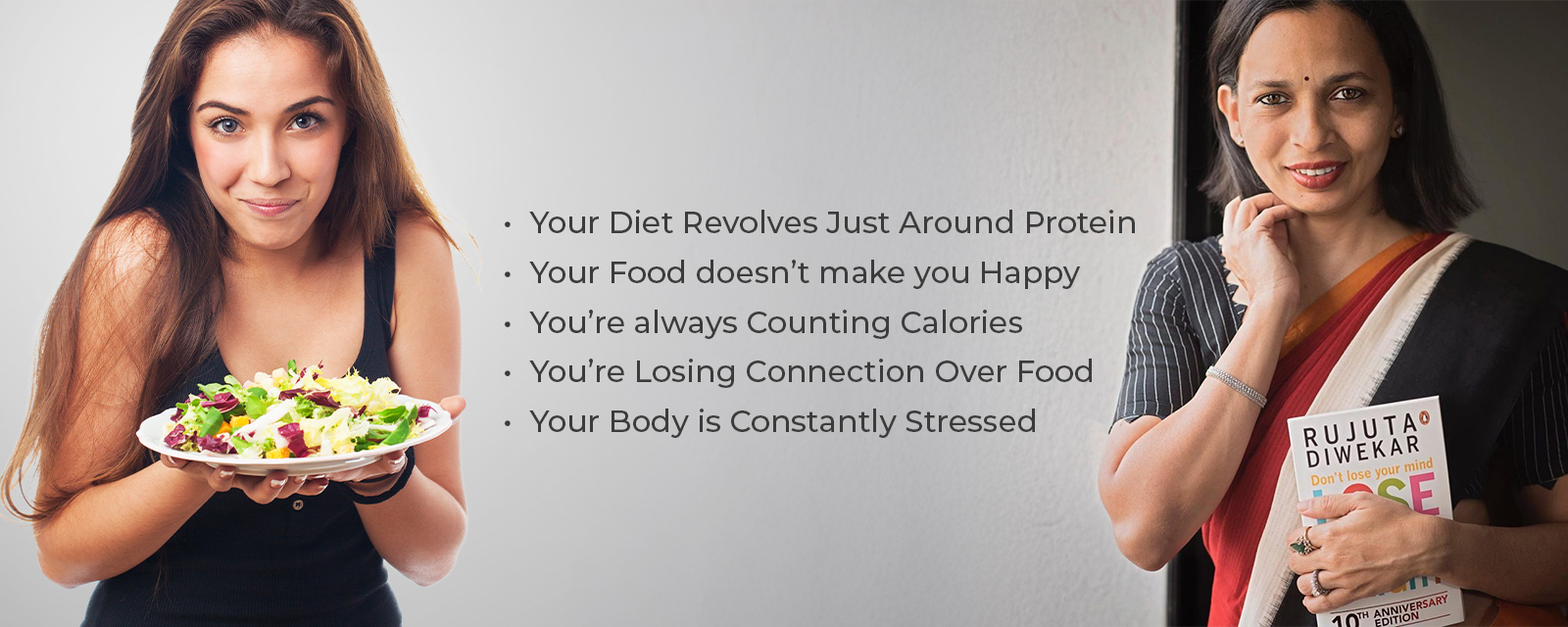We’re living in the era of quick weight loss plans and fad diets from fake influencers on the Internet.
There’s the keto diet, the low-carb diet, the high-protein diet, the Mediterranean diet, and intermittent fasting.
Starting a new diet can feel empowering, the motivation to lose weight is high, goals are clear, and the weighing scale seems to be decreasing.
However, nutritionist Rujuta Diwekar says that the weight you’ve lost can come back to haunt you if you don’t follow a sustainable diet.
A sustainable diet is eating the way you traditionally eat and making changes to control portions, including all the micro and macro nutrients, and having local produce.
Recognizing red flags early can save you from the frustrating cycle of losing weight only to regain it all when you stop following the diet.
Here are 5 warning signs your diet is unsustainable and destined to fail.
|
Table of Contents:
|
Your Diet Revolves Just Around Protein:
 People on the internet are demonising entire food groups and obsessing over single nutrients in the name of a diet.
People on the internet are demonising entire food groups and obsessing over single nutrients in the name of a diet.
Whether it’s the latest protein-heavy trend or an extreme no-carb diet, focusing on just one part cannot make you healthy.
Nutritionist Rujuta Diwekar says that if your diet is dominated by just one macronutrient, like protein, you will miss out on essential nutrients and vitamins for your growth and digestion.
Your body requires a balance of proteins, carbohydrates, and healthy fats to function optimally.
Fad diets can make your energy levels erratic, your mood swings intensify, and your body begins craving what it's missing.
Your Food doesn’t make you Happy:
One of the harshest things people do to lose weight is the complete elimination of happy food pleasures.
You don’t have that dash of ketchup that made your meal enjoyable, or the small sweet treat with family after meals that makes you happy.
Nutritionist Rujuta Diwekar believes that our foods represent comfort, celebration, culture, and simple daily joy.
When your weight loss diet strips you away from these small pleasures, it creates an emotional gap, and you start craving to get back to your older routine.
Deprivation is not sustainable, and weight loss plans should include small pleasures to make healthy eating enjoyable, not punishing.
A truly effective and sustainable approach is to find ways to include your favorite foods and flavors whole, still controlling portions and losing weight.
You’re always Counting Calories:
Perhaps the clearest sign of an unsustainable diet is when you anxiously count each calorie you consume.
Interestingly, calorie deficit, coupled with an active lifestyle, is the only scientific way to lose weight.
But if you cut back on traditional foods like roti or keep worrying about every bite, what begins as portion control evolves into food anxiety.
Losing confidence and mental clarity from your food can overload you with unnecessary stress, leading to weight gain.
A sustainable approach is based on teaching you to trust your hunger cues and make balanced choices without constant mental arithmetic.
You’re Losing Connection Over Food:
Food is a great way to connect with society, and when your diet starts isolating you from cultural celebrations and social connections, it's a major red flag.
Having modak during Ganpati, sheer korma on Eid, or cake at Christmas celebrations wouldn’t increase your weight.
Without the traditional foods, the festivals, family gatherings, and social events lose their shine.
Losing real connections only to follow some fad diet can make your friends and family lose their enthusiasm for including you in food-centered activities.
A sustainable diet finds ways to participate in cultural celebrations and social eating while maintaining your health goals.
Your Body is Constantly Stressed:
Picture this: your kitchen cabinet has probiotic drinks, prebiotic supplements, and various digestive aids despite following a weight-loss diet.
Your gut is the mirror of your overall health, and if you constantly feel bloated or constipated, your weight-loss diet is not working for you.
Nutritionist Rujuta Diwekar says that constant digestive discomfort and the need for supplements to maintain basic gut health indicate that your current eating pattern isn't serving your body well.
A truly sustainable diet should improve your digestion, energy, and overall physical comfort.
How to Follow a Sustainable Weight-Loss Diet:
We don't mean to discourage you from your weight loss goals with these warning signs. Instead, it’s time to reflect.
A sustainable diet and healthy living don’t require fancy ingredients, extreme restrictions, social isolation, or constant physical discomfort.
Your food should bring your nutrition and pleasure while also honouring your cultural food traditions and maintaining your social connections.
Build a sacred connection with your food, eat mindfully, practise portion control, and try to stress less about calories.
Key Takeaways:
In the end, your weight-loss diet should truly complement your whole life and not just a fancy meal plan.
When balance replaces extremes, when joy is allowed on your plate, and when food strengthens your confidence instead of feeding anxiety, you know you’re following a sustainable diet.
Food is more than nutrition - it’s culture, comfort, and community, and a sustainable diet honors all of that while still supporting your health.
Choose the approach that lets you live fully, not one that holds you back.







